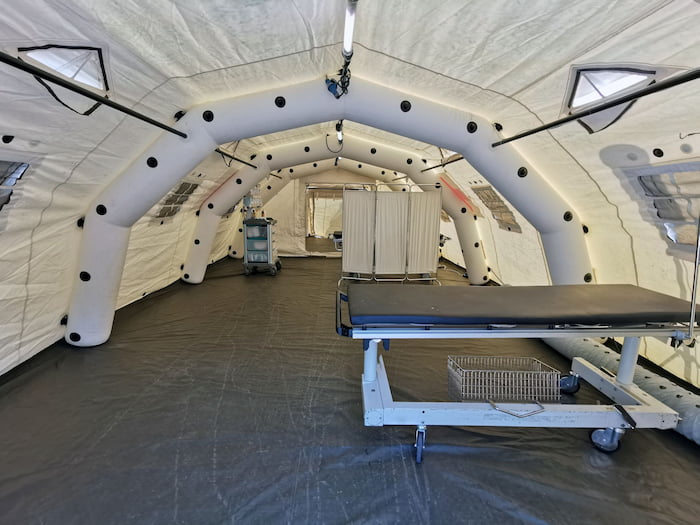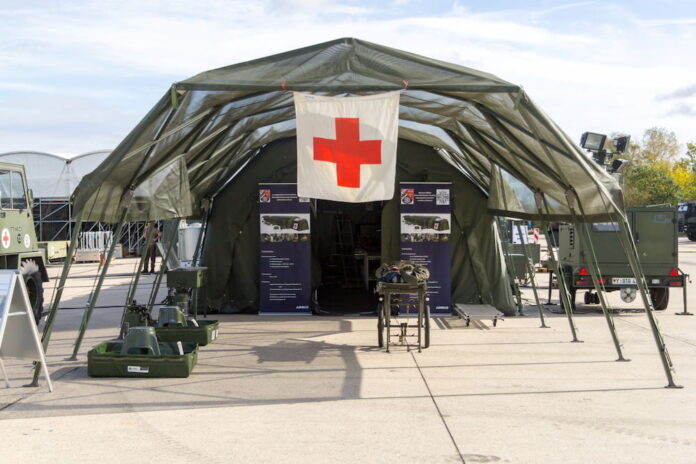Global warming and other environmental issues have recently exposed us to more frequent, violent, and highly damaging calamities.
The global Emergency Events Database (EM-DAT) recorded 432 disastrous events in 2021, a relatively higher figure than the 357 average between 2001 to 2020.
The first four months of this year were neither easy nor smooth sailing. There were violent cyclones in New Zealand, flooding in Brazil, tornadoes in the United States, and the Turkey-Syria earthquake, which claimed the lives of more than 50,000 people.
Major disasters put a heavy strain on resources, and most governments (especially in developing countries) are often unable to meet the compounding needs of their citizens. In such cases, military field hospitals are usually built to supplement, if not temporarily replace, struggling or non-functioning healthcare facilities.
Since natural disasters are inevitable, the government and private sectors must work together to adopt a proactive and flexible approach to calamity response. Field hospitals are the latest in that long line of solutions and may play a bigger role in the future.
Here’s how to prepare and set up mobile field hospitals for calamities.
1- Coordination Is Key
Host countries often need help to address large-scale disasters and would welcome any assistance. However, before setting up a mobile field hospital, it’s imperative for aid organizations, whether government or private-sector-led, to coordinate with authorities and other groups on the ground.
Organizations must likewise conduct a rapid assessment to determine the best location and offer other assistance modes to vulnerable, unserved, or underserved populations. Doing so ensures equitable healthcare access even during calamities. Studying the situation and acting according to needs allows seamless operations between and among humanitarian groups, benefitting the disaster victims.
2- Setting Up The Mobile Field Hospital
Mobile hospitals range from a few small tents to huge portable medical units within or near a disaster zone. The site must be safe from the next calamity or attack, as aid groups must put a premium on the safety and lives of their staff.
Here are some key considerations:
Choosing a location
While it’s important to be at the heart of the calamity area, you must consider factors like logistics, access to resources, security, and safety. Striking a good balance between these elements is necessary for deciding where to set up your operations.
Quick deployment
Ideally, the facility must be built within a day or two following an internal rapid assessment activity—where the medical team can identify priority healthcare needs. Field hospitals are classified based on their proximity, the number of medical staff, available medical equipment and supplies, and the services they provide.
Basic facilities required
At the minimum, mobile field hospitals must have access to a water source. Power supplies, like generators, vehicles, and telecommunications equipment, are likewise necessary. So are local volunteers, who may be medical professionals or individuals with a non-medical background.
Keeping these considerations in mind ensures the safe, efficient setup of field hospitals in crisis situations.

3- Building Your Team
The success of any healthcare facility largely depends on the medical team. Field hospitals are no exception.
Mobile field hospital staff should be skilled and experienced enough to work in high-pressure and challenging situations. Disaster victims undergo severe mental and physical trauma, and healthcare workers need special training to handle and interact with them efficiently.
Nurses must be skilled at triaging or identifying patients with urgent healthcare needs. In addition, employing reliable local staff may be necessary to work around communication and cultural gaps.
4- Equipping The Field Hospital
In most cases, field hospitals become the first point of contact for the sick and injured. Basic medical and pharmaceutical items must be available, including devices for taking and monitoring vital signs.
Equipment needs will depend on the procedures your facility is authorized to perform, including pain and wound management, minor or major surgeries, etc.
Regardless of the types of health care services to be performed, field hospitals must include a shelter for the staff and at least one each for patients’ isolation, waiting, and recovery areas. Such spaces ensure that patients don’t get worse while waiting for their turn or that they can recuperate from injuries and trauma as soon as possible.
5- Ensure Mobility, Safety, And Communication
Proper access to logistics and communication are at the front and center of every mobile field hospital operation.
Such a facility must have easy and swift access to supplies, personnel, and patients to ensure smooth operations. Any obstacle to mobility can hamper their operations and deprive patients of life-saving services.
Similarly, with communication, the mobile field team can perform basic operations and arrange supply pick-ups, patient transfers, or medical evacuations. These are priority factors when choosing the right field hospital location.
Personnel safety is also paramount in any disaster response. Besides ensuring that the field hospital is located outside hazardous areas, deploying security personnel nearby is best, especially in conflict zones.
The New Nexus Of Crisis Care
Disaster response must be quick yet tailored based on the priority needs of the affected population. The practices discussed above can be implemented to improve responses during emergencies without compromising the response team’s safety and security.
As such, mobile field hospitals must be versatile to meet the rapid changes in the field. A highly flexible yet scalable response can easily be set up and expanded as you improve your hospital operations internally, addressing the medical needs of disaster victims more efficiently.
Read Also
- The Role of Ingredients in Your Skincare: What to Look ForSkincare works best when you understand what goes into the products you use daily. Ingredients form the foundation of every formula and determine how the skin reacts over time. Each cream, cleanser, or serum has its own role, determined by its ingredients. Learning what to look for helps you pick products that help skin and… Read more: The Role of Ingredients in Your Skincare: What to Look For
- Your Guide to Finding a Trusted DentistChoosing the right dentist in Sandgate or your area is crucial for maintaining good oral health and achieving a confident smile. With countless dental practices to choose from, patients may find the task daunting. Data from the American Dental Association indicates that there are over 200,000 practicing dentists in the United States, highlighting the importance… Read more: Your Guide to Finding a Trusted Dentist
- Mastery Forge Webinar Platform – Choose Your WebinarWe live in a time when knowledge is literally at your fingertips. You no longer have to go on long courses, wait for free places or adapt to a rigid schedule of classes. All you need is the Internet, a little willingness and you have access to training courses conducted by experts from all over… Read more: Mastery Forge Webinar Platform – Choose Your Webinar
- Transforming Patient Care with Professional Healthcare Transcription ServicesIn today’s fast-paced healthcare environment, the need for precise and timely documentation cannot be overstated. Accurate documentation is not merely an ancillary task; it is a core element of delivering high-quality patient care. The ability to maintain compliance with regulations, enhance operational efficiency, and ensure the integrity of patient records has never been more critical.… Read more: Transforming Patient Care with Professional Healthcare Transcription Services
- Achieving a Defined, Balanced Facial Contour in SingaporeA well-defined jawline and a gently tapered lower face — commonly referred to as a V-shaped face — is a look many people aspire to. In Singapore’s beauty and aesthetic scene, treatments that help refine facial contours have grown in popularity as more individuals seek subtle, natural enhancements that boost confidence and balance facial features.… Read more: Achieving a Defined, Balanced Facial Contour in Singapore
- Beyond the Blueprint: Why Integrated Electronics Manufacturing Beats Fragmented SourcingBringing an electronic product to market is a complex orchestration of design, engineering, manufacturing, and logistics. The days of siloed operations, where a company would design a product and then simply hand off the blueprints to a contract manufacturer, are largely disappearing. In their place, a more integrated and efficient model has emerged: end-to-end electronics… Read more: Beyond the Blueprint: Why Integrated Electronics Manufacturing Beats Fragmented Sourcing







